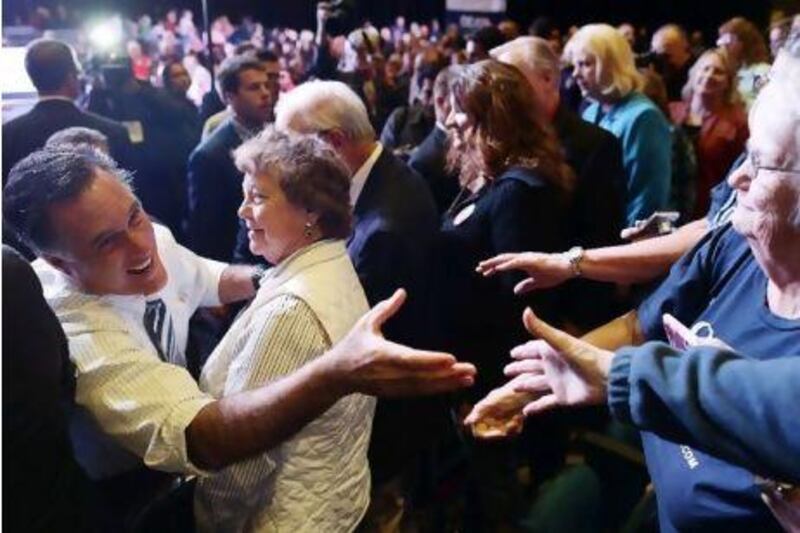LAS VEGAS, Nevada // It is people like Paul Prekop who make Nevada a maddeningly difficult state for the United States president, Barack Obama, to lock down, and who give the Republican presidential candidate Mitt Romney hope that there's a route to the White House even if he loses the big prize of Ohio.
Mr Prekop, 54, said he benefited from a union contract in his job as a casino craps dealer. He credits Democrats for the stock market's four-year rise. And he's grateful that Mr Obama's healthcare law lets him keep his young-adult son on his insurance plan. "I'm not really a big Romney fan," he added.
So, did Mr Prekop help to re-elect the president when he voted early on a gorgeous afternoon in a north-west Las Vegas suburb on Thursday? No.
"We just need a change," he said, explaining his vote for Mr Romney. "I'm scared of Obama the next four years, the socialistic things he's into."
If Mr Prekop was swayed by the avalanche of anti-Obama adverts on Las Vegas TV stations, perhaps it is understandable. No region in America has seen more presidential campaign commercials. Last week alone, Mr Romney's campaign and its allies spent US$3.6 million (Dh13.2m) on television advertising in Nevada, while Mr Obama and his supporters spent $2.7m.
Interspersed with the hard-hitting presidential adverts are even harsher commercials for the state's fiercely contested Senate race and House contests.
Some strategists in both parties said the endless flood of TV adverts, phone calls and mailshots may cancel out each other, making door-to-door voter turnout efforts more vital than ever.
"I see tonnes of TV ads. I just ignore them," said Juanita Sowell, 50, a college administrative assistant who joined about 13,000 others to see Mr Obama at an outdoor rally in Las Vegas on Wednesday. Several said they no longer answered their phones, to avoid campaign pitches.
Mr Romney also campaigned in Nevada last week, making stops in Reno and Henderson.
The flood of spending reveals Nevada's potentially crucial role, even though it draws a fraction of the national attention devoted to Ohio.
If Nevada's importance is clear, its political landscape is quirky.
A sizeable Mormon population coexists with the strip clubs, casinos and "Sin City" legacy of Las Vegas. Mr Obama is counting on big margins from Latinos - 27 per cent of the state's population - and from labour unions, anchored by Las Vegas's hotel and restaurant workers.
But joblessness in Nevada is running at 11.8 per cent, the nation's highest unemployment rate. And the state was clobbered by the collapse in home values, with thousands of borrowers owing more than their houses are worth. Mr Romney lays these and other economic troubles at Mr Obama's feet.
"Can you afford four more years of doubling of the gasoline prices you're paying?" Mr Romney asked a crowd in Henderson last week.
"With the millions of dollars from special interests flooding Nevadans' television screens, phones, and mailboxes, eventually you hit a point of diminishing returns," said Obama campaign spokesman Ty Matsdorf. "Our organisation is so important because a neighbour-to-neighbour conversation can cut through all the adverts out there and show voters what is at stake."
As of Friday, about a quarter of Nevada's voters had cast their ballots, and Mr Obama seemed to have an early voting edge.
About 46 per cent of the ballots were cast by registered Democrats, and 36 per cent by Republicans.
But Republicans say such statistics can be misleading.
"We know Republicans vote later in the process, and we're right where we want to be," said Mr Romney's campaign spokesman, Mason Harrison. "We always knew the race would be neck and neck."






